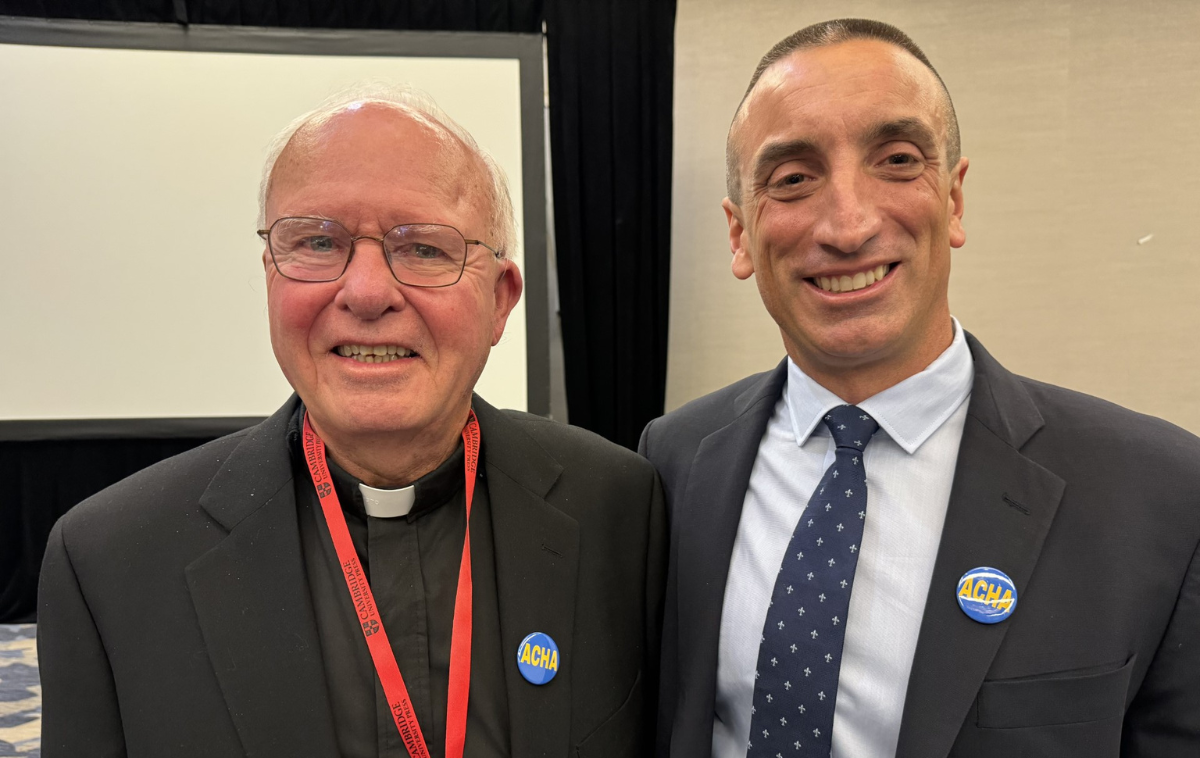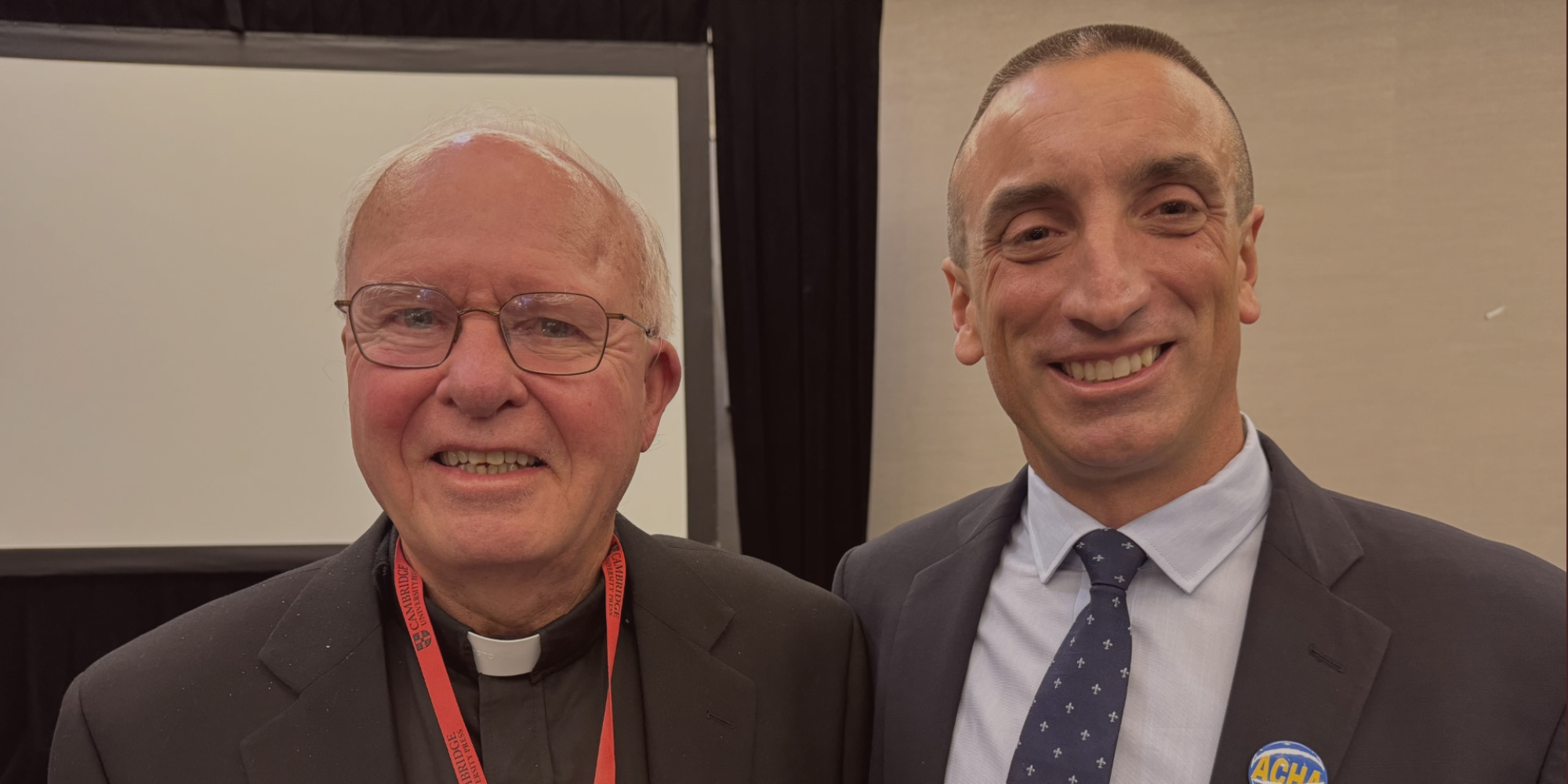ACHA bestows lifetime contribution honor on Br. Joseph Chinnici
Author: Eli Pacheco
Date Published: February 05, 2024
The American Historical Catholic Association rarely bestows lifetime contribution awards. When it does, it chooses someone impactful like Br. Joseph Chinnici, OFM, who has devoted his life to the scholarly and pastoral pursuit of American Catholic history.
Br. Joseph, a renowned scholar, speaker, and teacher, has served many administrative posts in theological studies. Few figures in the Catholic church have influenced the melding of pastoral and historical work the way he has.
ACHA president Michael Pasquier presented him with the distinction on behalf of the ACHA at its annual awards luncheon in January.
It was an honor that took Br. Joseph by surprise, but one that he was grateful to accept.
“It is important for Franciscans to be involved in scholarly endeavors and to meet other scholars on a professional level,” said Br. Joseph, president emeritus and professor of history at the Franciscan School of Theology at the University of San Diego.
Michael cited Br. Joseph’s tenure of more than 40 years as an intellectual leader in Catholic history.
“His books and articles shaped a generation of scholars committed to understanding the lives of Catholics in the United States,” Michael said. “His leadership and service to the American Catholic Historical Association are a testament to his generosity of mind and spirit.
“The future of the ACHA is bright because of people like Fr. Chinnici, men and women who value rigorous scholarship, caring mentorship, and a love of learning,” he added.
Br. Joseph has dedicated his pastoral and scholarly life to promoting Catholic scholarship. A graduate of Oxford University, he is a former ACHA president who has written dozens of articles published in journals and publications including U.S. Catholic Historian, The Catholic Historical Review, and American Catholic Studies. He is the author of three Catholic history books:
Living Stones: The History and Structure of Catholic Spiritual Life in the United States
When Values Collide: The Catholic Church, Sexual Abuse, and the Challenges of Leadership
American Catholicism Transformed from the Cold War to the Council
Br. Joseph transformed the way we disseminate American Catholic history by melding the pastoral and intellectual observation of religion for a greater understanding of how worship and scholarly discourse work together.
“Being a professional historian and also a friar and priest, it’s a combination of all those things,” Br. Joseph said. “I have been a student of American culture and I teach courses on global Catholicism. We need always to be responsive to the signs of the times.”
Impact on the association
In 1976, Br. Joseph attended his first ACHA meeting. A teacher in Berkley, California, then, he wore the Franciscan School of Theology-approved formal clothing.
“I walked into a sea of clerical garb, and there I was, sportscoat and tie,” Br. Joseph said. “I was there for a few minutes and one other guy came in who happened to be a layperson, also in a sportscoat and a tie. He ran over to me, embraced me, and said, ‘I’m so happy to see someone like me!’ I said I hated to disappoint him, but I was a Catholic priest and a Franciscan friar.”
Years later, Br. Joseph would make another statement with his clothing.
Because of his work as ACHA president, the association flipped from mostly clergy to mostly laypeople. This time, he set out to make a different point by wearing his clerics.
“I came in a black suit with a collar, and the association was almost entirely laypeople,” Br. Joseph said. “I wanted to indicate that there was still a priest around who was dedicated to history.”

From left, Br. Joseph Chinnici and ACHA president Michael Pasquier
A gender breakthrough
Br. Joseph helped elect the ACHA’s first female president when he was chairperson of the nominating committee. “Several distinguished women could have been president by that time, but there hadn’t been any,” he said.
He nominated Dr. Annabelle Melville, a leading American Catholic historian known for her definitive biographies of prominent Catholic figures including St. Elizabeth Ann Seton. Br. Joseph described her as the “most distinguished female historian.” She was elected.
“Since then, we have had multiple female presidents of the association,” Br. Joseph said. “Having women represented in leadership still has some ways to go.”
Helping the association flourish
When he became ACHA president in 2007, Br. Joseph advocated to change the association’s constitutions, in consultation with past presidents. The result: A more vital organization with a majority of lay members rather than clergy.
“The people helped set a strong foundation,” Br. Joseph said.
This award recognizes his contributions, but his lasting impact on the trajectory of the American Catholic church – and the Franciscan friars – will be his legacy.
Photo and video courtesy of Br. Jack Clark Robinson, OFM

